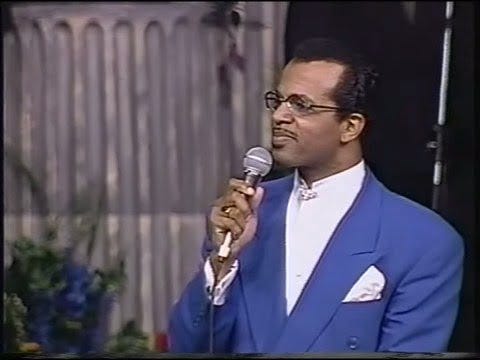Bishop Carlton Pearson (1953-2023)
Remembering the controversial religious figure whose Azusa conference defined the 1990s and whose theological shift rocked the evangelical world.
Yesterday, the world learned about the death of Bishop Carlton Pearson—one of the most important religious figures of our lifetime. Aside from the vital work that he did as a theologian, he also was a preserver of the gospel sound. Describing himself as “metacostal”—a fusion of his “pentecostal roots in spiritual transcendence” with metaphysical principles—he continued in the tradition of lesser-known preachers and teachers before him who also shared these ideas and beliefs.
Bishop Pearson’s shift from a more conventional brand of Christianity into what became known as the gospel of inclusion was met with such a horrific response from the church-at-large because of his fame. He was publicly deemed a heretic by the Joint College of African-American Pentecostal Bishops’ Congress and declared an endangerment by Pastor Jack Hayford.
Asking the general public (and religious leaders with economically rewarding ministries) to consider why they believe what they believe is a daring move. The reality is: most people don’t know why they believe what they do. It’s simply what they’ve been told and they repeat it. Leaders with followers and money coming in the offering plate, simultaneously, have no reason or reward in changing their values. So when a beloved public figure begins to unpack the rhetoric, people, most often, choose to cling to the familiar rather than opt to understand things differently. Unlearning and then finding belief is hard work.
In 2003, I had a crisis of faith. I'd been expelled from a church in Nashville. It was the greatest thing that could have ever happened to me, even if I didn’t know it at the time. It gave me the opportunity to cut away from the noise and find out what I actually believed. Shortly after that, I read an article about Bishop Pearson's expanding theology that had also, essentially, gotten him expelled from Christendom. Pearson's revelations rang true for me and, on a whim, I sent him an email which he shockingly responded to. It opened up an exchange and connection that I'll forever be grateful for.
When Bishop Pearson was promoting his book, The Gospel of Inclusion: Reaching Beyond Religious Fundamentalism to the True Love of God, I asked him to come on my radio show and share about the book and the underlying revelations that inspired it. I re-edited our interview a few months back and uploaded it to YouTube a month ago. I hadn't listened to it in a long time and I am astounded by the ways that this conversation laid the groundwork for this exact moment in my own becoming. If you’ve only heard discussion about Bishop Pearson’s beliefs, our interview serves as a wonderful gateway/introduction to what he actually believed.
In addition to being a preserver of traditional gospel music, Bishop Pearson understood the role of the artist in expanded consciousness. In an interview with Synervision, he explained:
The word “music” comes from the word “muse” to think. They are science of mind, although they don’t use that terminology. They do a lot of thinking. It’s called the science of the muses. They are sitting there with a keyboard; they are thinking lyrically and intonationally and ambiances and vibrations. I am going to teach that group more about that: the power of energy of the human being and being human. We are not human doings. We are human beings.
I hope that in remembering Bishop Pearson’s life people do more than just watch the videos of him during his evangelical heyday and become more willing to truly listen to and contemplate the things he was decried for saying. He once said,
“The way to know God is to know yourself. If you’re created in the image and likeness of God then you’re the closest to God you’re ever going to get. So study yourself – investigate, interrogate, excavate your own soul – even if something has died in you, do an autopsy. Don’t tell me the disease, tell me what caused the disease that brought death to your relationship with you. And that God expresses itself to you, through you, and as me. We’re all inextricably connected. And the rest of it is mystery. Embrace that.”1
Thank you Bishop Pearson for your visionary eye, courage and willingness to speak the truth that made and continues to make so many uncomfortable. As time continues to roll on, I know that these truths for which you've paid such a price will soon become commonplace.
https://www.reform-magazine.co.uk/2013/04/hell-and-high-water/




I am so sorry for your loss and for everyone's, so grateful for this courageous life. May Bishop Carlton Pearson rest in peace and power.